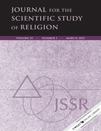Religion, Volunteering, and Educational Setting: The Effect of Youth Schooling Type on Civic Engagement†
The authors contributed equally to this article.
Acknowledgments: The National Study of Youth and Religion, http://www.youthandreligion.org/, whose data were used by permission here, was generously funded by Lilly Endowment, under the direction of Christian Smith, of the Department of Sociology at the University of Notre Dame, and Lisa Pearce, of the Department of Sociology at the University of North Carolina at Chapel Hill.
Abstract
Research on civic engagement shows that volunteering rates decline as young people move from adolescence into emerging adulthood. Using panel data spanning this period of the life course, we examine the impact of secondary schooling type—public, Catholic, Protestant, private nonreligious, and homeschool—on sustaining volunteering into emerging adulthood. We apply a framework that posits pathways between secondary schooling and sets of opportunities to volunteer embedded in institutions and social networks. We also posit a link between schooling type and durable motivational dispositions to volunteer. Results indicate substantial differences by schooling type, although our measures of opportunity structure and motivation do not adequately account for these differences. Those educated in Protestant secondary schools are considerably more likely than other young people to continue to volunteer, even accounting for potential spurious influences. Those schooled at home or in private nonreligious settings are significantly less likely to continue volunteering. We conclude by discussing two alternative accounts that should be addressed in further research: one focused on the role of habituated social practices and the other focused on differences in organizational efforts to link adolescent volunteering to emerging adult volunteering.




